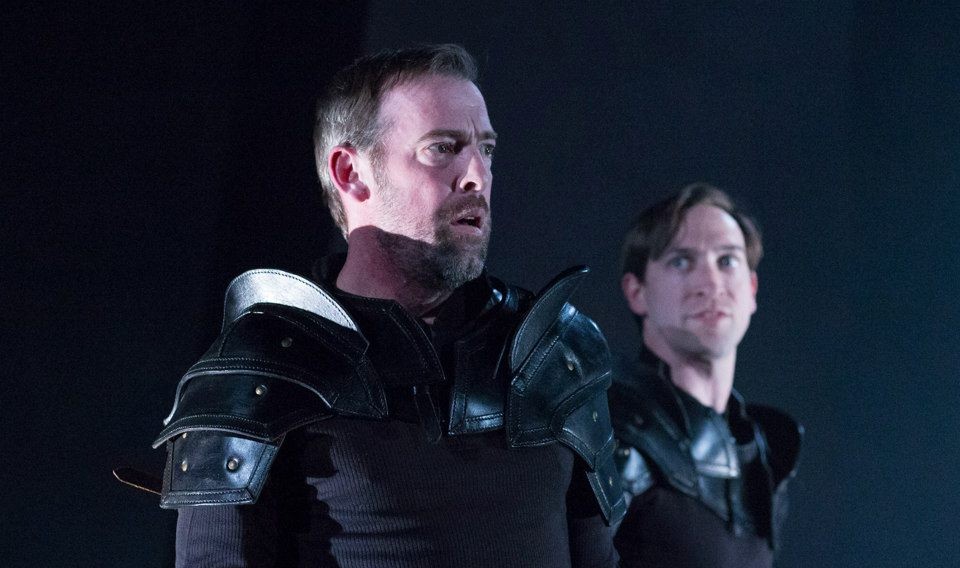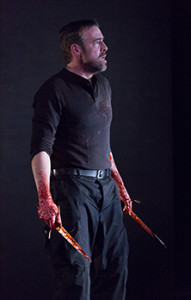Note: This review launches a new feature section on Phindie: Critical Mass. Each week for the remainder of the play’s run, a reviewer from this publication will return to the Arden to reconsider the work and respond to previous critical takes. Read more about this here.

As the artistic director of Quintessence Theatre Group in Mount Airy, Alexander Burns has built an audience for his energetic contemporary adaptations of classic theater. His work on MACBETH for the Arden Theatre Company marks his introduction to the larger Philadelphia theater audiences. In it Burns maintains the energy and pacing of his best work for Quintessence and takes full advantage of the Arden’s high production values to create an exuberant and understandable—though perhaps shallow—version of Shakespeare’s masterpiece.
The fictionalized tale of a tormented Scottish usurper propelled to the throne by otherworldly prognosticators and doomed to his demise by the same mechanisms of fate is one of the Bard’s most enduring works. Yet Burns seems to presuppose a familiarity with the text which may leave uninitiated audiences confused. His Richard II at Quintessence befuddled audiences unfamiliar with the play. Likewise, although his MACBETH reveals the majesty of Shakespeare’s poetry and scene-by-scene emotion, Burns’s quick-fire adaptation leaves some tragedy furled up in undeveloped interpersonal interaction.
Nevertheless, Burns is appealingly enamored by the beauty and feelings of Shakespeare’s language; his actors deliver lines in clear diction, eschewing the confusions of accent which mar many American productions of Shakespeare. In the title role, Ian Merrill Peakes exudes strength of character without exaggerating military pretensions and dives into pits of self-doubt without appearing an ineffectual philosopher. His understanding of his lines is infectious and leaves one marveling at the insight of Shakespeare’s phrases. Never more so than in the “Tomorrow and tomorrow and tomorrow” soliloquy, which Burns stages inventively, bringing Lady Macbeth’s body onstage as corporeal manifestation of Macbeth’s sorrow.

Burns is not afraid to change a word or two of Shakespeare if it unlocks meanings; at times, he’s willing to take a machete to the text. In some productions, Shakespeare’s comic scene of a drunken porter summoned to answer a door can feel jarringly out-of-place, coming as it does immediately after Macbeth’s murder of the sleeping king and just before the dramatic discovery of Duncan’s body. Here, Burns discards much of Shakespeare’s text, yet retains the concept: the porter imagining himself as the doorman to hell (he’d be busy). The jokes are darkly humorous (“knock knock” “who’s there” “lucy” “lucy who” “lucifer”) and Christopher Patrick Mullen’s delivery is impeccably measured. Literary pendants will be horrified, but the admonition “remember the porter” is rarely so well heard and the relevance of the comic relief to the larger play is rarely so evident.
In other supporting roles, Carl Clemons-Hopkins stands out as Ross, bringing a patrician nobility and thoughtful care to the Scottish lord who eventually turns against Macbeth (though this betrayal is somewhat muddled in Burns’s take). Aime Donna Kelly succeeds as Lady Macduff in an emotional scene with child actor Yannick Haynes. Josh Carpenter excelled as a youthful Hamlet in Burns’s energetic Quintessence production and brings the same fuel to his role as Malcolm, son of the murdered king and Macbeth’s rival to the throne.
Ben Dibble plays an anodyne Banquo, Macbeth’s doomed companion, building sympathy for the character without imposing himself on the role; he brings nuance and humor to his other turn on the stage, as Lady Macbeth’s doctor. As Lady M herself, Judith Lightfoot Clarke affects an aristocratic disdain which gives a clear though one-note reading of the character’s sinister manipulations; she struggles to carry this same affectation to her scenes as a hostess or in the throes of madness.
As a thirty-something director, Burns brings an MTV-era cinematic mise en scene to his stagings which finds full realization with the Arden’s production team. Brian Sidney Bembridge’s dramatic industrial-stone age set (think Terry Gilliam Stonehenge) is darkly sparse yet multifaceted; Solomon Weisbard’s lighting is precise and atmospheric; accompanying sound (design by James Sugg) adds to the foreboding tension without overpowering the dialog. These instruments of darkness interplay most successfully in fight director Paul Dennhardt’s freeze-framed battle sequences, engaging sections which frame a production which engrosses though never feels fully tragic. [Arden Theatre Company F. Otto Haas Stage, 40 N Second Street] March 5-April 19, 2015; ardentheatre.org.
